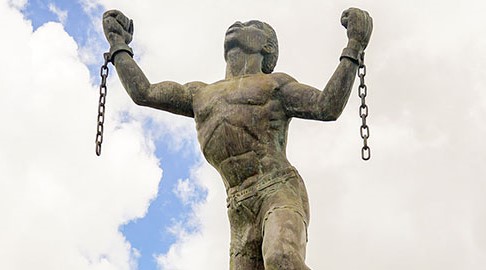The first batch of UWI Masters students studying Reparatory Justice were enrolled this academic year at the Mona and Cave Hill campuses.
The programme is focused on the Caribbean and the movement for slavery reparations which also draws on case studies from around the world.
Reparations centre around compensation, usually financial, sought as redress for the slave trade that took place in the past centuries.
Students completing this Masters programme will graduate with both a degree from The UWI and the University of Glasgow, as it is a joint initiative between both institutions.
The UWI is at the forefront of the global movement, leading activism and academic research underpinning claims for reparations for slavery. The University of Glasgow offers access to primary source materials and material culture holdings. It draws on expertise across the study of slavery, genocide, and human rights violations. The degree continues the University of Glasgow’s work in its ongoing reparative justice programme, which is part of the nine recommendations found within its Slavery, Abolition and the University of Glasgow report, published in September 2018.
Jheanelle M Owens, is signed up for the programme at The UWI Mona Campus in Jamaica; where the campus grounds still bear the marks of a past steeped in plantation history, said: “The case for reparations has become severe, and this programme is so timely. This master’s programme gives me hope that we are moving in the right direction as a global community. I am pleased to have been selected to be part of this programme. I am an African woman born in Jamaica; to express who I am so clearly should be a right, but is in fact a privilege in the Western world. Many people cannot identify their origin, language, or history with pride.”
Similarly, fellow student Vakeesha John, who is enrolled at The UWI Cave Hill Campus in Barbados said: “When I think about life as a Black woman, a Caribbean woman, I think of my journey; the social, mental, spiritual and physical, as the process of coconut milk making; the coconuts are grated, diluted then squeezed. The juice separates itself into a filtered form, taking most of the nutrients of the coconut, and the residue remains drained of its richness and, in most cases, is discarded. This reminds me of the journey of the Black, enslaved man and woman. Our riches, our culture, our strength was squeezed out of us; we’ve been drained of our very essence, our social and spiritual nutrients and the residue that most of our societies have to deal with contains poverty, a lack of awareness, illiteracy, a feeling of inferiority, inequalities. I have experienced this, and my goal is to empower myself with knowledge to better edify my people through activism, writing, and teaching and to fight for us to get back to our purest form. I am therefore honoured to be a part of the first cohort to benefit from this course.”
Cordelia Asmoah, who is studying at Glasgow after returning to learning alongside a career in procurement consultancy, said: “Finding solutions to repair the negative impacts of slavery that continue to plague society is critical to the progress of humankind. I therefore, feel both privileged and excited to be in the first cohort for this important and groundbreaking programme.”
Another student, Cllr Graham Campbell, a veteran political campaigner and community activist, as well as being one of the three advisors to Glasgow’s History of Slavery report, said: “I am looking forward to hearing about the international legal jurisprudence and discussion on the human rights dimension of the case for reparatory justice. I’m delighted to be part of this first cohort in an important pioneering collaboration between UWI and UofG of a joint MSc/MA from both institutions. I have already met fellow students based in Kingston, Jamaica, joining us online and relish the chance to share experiences of the reparations and reparatory justice movements in the Caribbean and Scotland as well as in the rest of the UK, Europe and the Americas.”



Responses